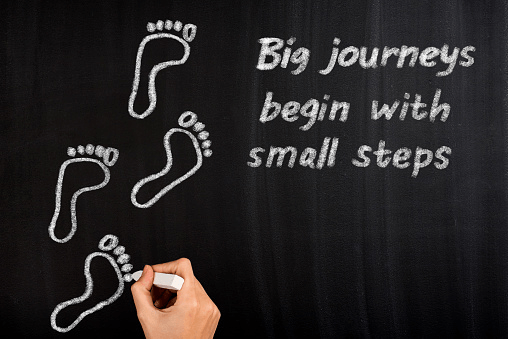,Clearly Define the Goal
We do not all have the same needs at the same time, and some goals can seem exceedingly small, as in getting to bed earlier; and other goals can seem insurmountable such as “feeling better.” What we really need to consider is that “getting healthy” or “losing weight” is so broad and has so many cogs in the machinery, which setting the goal and assessing progress may also be too cumbersome to do. We will use weight loss as a goal to explain this concept. To state that you “want to lose weight” is vague and without direction. It is far more specific to develop the goal of losing five pounds in one month. It also could be specific to state that the weight loss goal includes fifteen pounds in 4 months. You may consider that you may want to be fully Paleo in your dietary strategy in 3 months, but that is different from a weight loss goal. Weight loss may be your goal, but going Paleo changes a lifestyle habit, which could be a great goal, but it also may serve as a “small step” to get to a weight loss goal. The beauty of your goal is that it is all yours. You do not have to set a weight loss goal if that concept is too overwhelming and has left you frustrated to the point you threw the towel in each time you tried it. Goals can be anything in the health-related topics, because they all are tactics and tips to help you live more comfortably in your human body

Make Small Steps
Do not tackle everything at once. Let us continue to use weight loss to illustrate how even the simple goal of losing five pounds in a month can be daunting if you have decided to start working out, attempt three days fast, go on a Paleo diet, do a nutritional detox, start a food diary, and join an Overeaters Anonymous group. Each action step requires its own energy and planning. You also may not even like some of the action steps you have proposed, and then how could you sustain something you do not like? Get out the pad and paper or computer and get specific. You could have a step that may take a long time, such as changing your grocery shopping and food prep to be Paleo over a one-month period. You could also consider the Paleo step in one week. Assess that small-step list to include realistic objectives. If a three-day water fast sounds torturous, no one told you to do it. If that excites you, then put that high on the list of steps to achieve your goal. Pace yourself. Infusing in a small plan to walk toward the larger plan can be in days, weeks, or months. You drive it, but plan and outline these small steps to contribute to the goal, and be the most successful that you can be.

Assemble Your Team
This is as important as the steps you would like to take. In fact, this may take a while and be prerequisite to starting your mini goals. I have seen many patients who are stymied by the fact that they are on medications and would like to get off them (as an incentive for driving a weight loss goal), but really need to have a physician willing to journey alongside to help with lifestyle allowing the decreased polypharmacy. Another “team member” may need to include a spouse or family member who has daily contact with you. Does that person have shared goals? Will that person assist in the dietary changes in the household, or worse, create sabotage to get in the way of the steps? Figure out who may resonate with you and what style is uniquely yours. Some patients prefer coaches. Do you like that accountability and assistance, and if so, do you prefer someone online or in person? This step may take awhile until you have researched and found one suitable for you. Are you a “joiner” in that a simple Facebook Group would help, or do you need to go so far as a “Weight Watchers” dietary program? Is there a member at a gym you would like to help you? Never underestimate the power of friends. They may be every part of your team to offer encouragement, distraction, support, or healthy tips. Silly as it may sound, you may have to engage your pet in this venture. The household may change, and if your pooch may prefer to be on the couch, but you need to get more exercise, walking your dog may be part of the plan, and the doggy will be part of the walking program and your number one cheerleader.

Assess Your Progress
I cannot stress this step enough. Progress may look like many things to many people and even this category may need some time to prepare. Carrying the weight loss goal through of losing five pounds in a month, you may consider assessing your weight every week. You might assess one of the small steps as part of this process. For instance, you can easily track steps or amounts of days you exercised in that month. You may go to a team member for the assessment, and potentially you may use bloodwork, vitals, or tests as progress. Fit-Bits and trackers make it easy to track HR and mileage, and while this is not the measurement of weight, these may satisfy your progress to know whether your program is working for your specific needs. You might use the way that your clothing fits you or the renewed energy you have as progress without even getting into a number assessment until the one-month mark. If one of your first steps included a Paleo approach to eating, you can journal how many times you ate “off-Paleo.” I notice many patients enjoy a photo journal to eventually have the “before and after” final assessment. Video logging and social media groups motivate as well as provide a unique opportunity to catalog headway. Blogs can also help being mindful and introspective on those habits that are working and those that are not. Keeping any kind of tracking system and in any way that looks visually is helpful is for you. This does not need to be posted publicly unless that resonates with your version of accountability.

Reward Yourself
The usual dieter wants to “cheat” or have an off day if they are looking at a weight loss goal, but I have found that reward systems can also be as creative and distinctive to the person as the small steps may be. I have seen everything from a big pay off in the end, such as a cruise or vacation, to a new wardrobe. I will also encourage consideration to paying yourself in the small steps when you assess those in your progress phases. You may reward yourself with a new team member in the coaching or healing arts or a puppy! You might now want to join a sport team or hobby group. It may also be time to assess work out clothes, a girls’ day, pampering, new hair style, and even a new job. Sometimes a cash jar adds up to a big payout in the end, and there are so many ways to reward without the saboteur you are trying to avoid. Even a good journal, book, podcast, or lecture series may be your best payoff. Keep those team members handy because they may be part of your reward system.

Pivot When You Need to
Trying to stick to a routine that does not work, is not enjoyable, and does not resonate with your life in general will not work eventually. The assessments along the way will help determine which things just simply will not stick. In the case of losing five pounds in a month, and back to fasting, you realized that a three day fast is just too scary to entertain, but you have decided upon intermittent fasting. During the journey, if you find that you are constantly hungry, headachy, or tired, you can easily decide that any variation of fasting will not work for you. That is ok, and you can create your own personal “work-around” and free yourself from bondage. Your health journey certainly will not be structured identically to anyone else’s path. I have even thought of scenarios where geography may limit someone’s ability for outdoor exercise or gain access to organic farms. You may even hit roadblocks for cutting back medications, and that should not be a deterrent to give up all together. Pivot. Frustration, slow progress, and no progress is not failure. It is that art of learning about yourself and working with those pitfalls to help you be successful THIS time around. It would also be quite enjoyable to see the initial planning and outline for the small steps, and what eventually became the ultimate program after the assessments and pivots along the way. Pivoting may also change the goal in the first place and show that the goal may have been unrealistic. You were not overweight at all but needed to change body composition and never needed the weight loss. In the process of trying to lose weight, your clothes fit better, and that was enough to give a health boost. The goal of going vegan turned into modified Paleo because it did not nourish you enough along the way. There is also a good chance that along the way you have found your inner self and found the next goal of spiritual fulfillment and socialization needs. And these pivots may force you to put one goal on the back burner, because a new goal came to the forefront.

You can decide if you are the supreme planner and have vision boards and notebooks and journals ready to go. You may store these concepts in your head and attack them in a loosely configured process instead. Success requires some mindfulness and an engaged undertaking that starts from within yourself. Good luck and savor the ride!






Comments are closed.